For as long as he’s been alive, Pedro Salceda has needed miracles. Lots of them.
While still in his mother’s womb, doctors discovered he had gastroschisis, a condition where a hole in his abdomen caused his intestines to develop outside his body. As soon as he was born, surgeons worked to put his intestines back into his abdomen – only to find them riddled with small holes in some places and blocked in others.
They managed to save Pedro’s life, but doctors told his parents he wouldn’t live past his fourth birthday.
But early on a recent Saturday morning, 25 years and 10 surgeries later, Pedro put on his LA Football Club jersey and got in a car with his mother and father, Gerardo and Claudia, for the three-hour drive from San Diego to Santa Paula, California.
They came to pay tribute to Santo Niño de Atocha, a centuries-old statue of the child Jesus whose devotion in Mexico is almost comparable to that of Our Lady of Guadalupe. Santo Niño, they believe, is the reason Pedro is alive.
“We come here out of gratitude,” said Gerardo. “He suffered from this for 20 years, and there was no solution.”
Stories like the Salcedas’ were not hard to find among the more than 2,000 people who descended on Santa Paula on May 25, when Archbishop José H. Gomez kicked off the annual two-week pilgrimage of this replica statue of the child Jesus brought from the Santo Niño shrine in Zacatecas, Mexico.
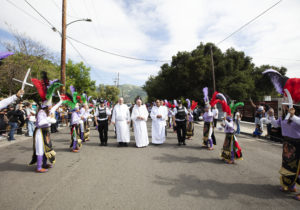
Young dancers from a parish in Oxnard were part of the Santo Niño’s procession through the streets of Santa Paula May 25. (Victor Alemán)
Devotion to the Holy Child image began in medieval Spain and became popular among Spanish speakers in the New World, especially in Mexico and the Philippines.
For nearly twenty years now, the statue’s visit has drawn faithful from around the U.S. to this town in the scenic Santa Clara River Valley, transforming the little parish of Our Lady of Guadalupe into a scene resembling small-town Mexico, complete with a makeshift food court serving tamales and sugary buñuelos, pop-up shops selling religious items from Mexico, and Mariachi bands singing during Mass.
Before the Saturday vigil liturgy, a pick-up truck brought the Holy Child, sitting in a golden throne and canopy, in procession from a local park to the parish. In front and behind him followed a full marching band, folk dance troops from neighboring parishes in Ventura County, and children with feathered headdresses bearing the image of Our Lady of Guadalupe. Whether performing during the procession, trying out the different foods, or standing in line to get their Santo Niño statues blessed, everyone seemed to have something to do.
Farm workers make up the biggest contingent of worshippers Dome sees at Our Lady of Guadalupe: some Santa Paula longtime residents, others itinerant workers who spend a few months each year in the nearby fields before moving on to jobs in other parts of California.
One constant over the years is that many of these migrants to Santa Paula have hailed from Zacatecas, the North-Central Mexican state where the Santo Niño devotion started.
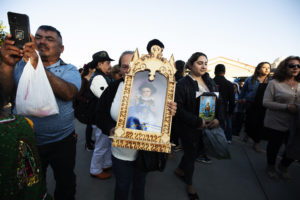
Many brought statues and images of the Santo Niño to be blessed during the May 25 festivities in Santa Paula. (Victor Alemán)
As the parish grew, so did a grassroots campaign to bring the Holy Child to faithful who, often due to their complicated legal status in the U.S., couldn’t return to the town of Plateros in Zacatecas, where the Santo Niño’s shrine is located. The pilgrim image made its first visit in 2007.
“The event was born from the parish itself,” explained Claudio Frias, a Zacatecas native and Guadalupe parishioner who’s lived in Santa Paula since 1970. “First they started coming from the counties nearby, then up from Fresno, Merced, Sacramento. Then Utah, Colorado, Texas.”
Apart from the Zacatecas connection, the statue also speaks to migrant workers for historical reasons.
Devotion to the Santo Niño dates to the 13th century, when parts of Spain were under Islamic rule. In the town of Atocha (located in present-day Madrid), Christian prisoners were refused food by their Muslim captors, but were allowed to be brought food by their children – a rule that meant starvation for childless prisoners.
Turning to a statue of the Virgin Mary holding her infant Son at the town’s church, the women of Atocha pleaded to the child on those prisoners’ behalf.
Soon after, the story goes, witnesses reported seeing a small child with a basket quietly slip past the prison guards to bring the hungry inmates food and water. Meanwhile, visitors to the Marian statue noticed the child’s sandals were showing signs of wear – generating the belief that it was the “Niño” himself who was making the nighttime visits.
When the Spaniards brought the devotion to Mexico centuries later, the child had a reputation as an intercessor who liked to stay on the move.
“Those little sandals tell us of a walking child, an itinerant child,” said Father José de Jesús López Acosta, rector of the sanctuary in Plateros that’s home to the original Mexican Santo Niño statue. “For that reason, many of our migrant brothers who’ve had to walk through the desert identify with Him a lot.”
López brought the pilgrim statue to Santa Paula, and will accompany it until June 9, when the Bishop of Zacatecas will come to celebrate a closing Mass expected to draw at least 5,000 people.
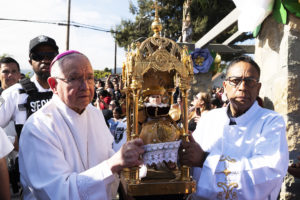
Archbishop José H. Gomez and Father José de Jesús López Acosta of Zacatecas, Mexico carry the pilgrim Santo Nino image in procession before Mass at Our Lady of Guadalupe in Santa Paula May 25, 2024. (Victor Alemán)
Back home, López has seen a surge in devotion to the Holy Child amid an increase in cartel-related kidnappings across Mexico.
“Mothers bring many images of their sons to the sanctuary to pray that if the Santo Niño allows it, their children may return home,” said the priest. “Or at least that they may be able to recover their remains for burial.”
In Santa Paula, visitors asked for health, protection, and strength to endure difficulties – but brought prayers of thanksgiving, too.
Jessica Sanchez came from Bakersfield with her husband and 11-month-old daughter, Eloise, who was born with what doctors worried was cancer in her lymph nodes. Sanchez’s mother, a Zacatecas native who attributes her multiple recoveries from cancer to the Santo Niño’s intercession, encouraged them to ask for his help. Three months later, X-rays showed “there was nothing there.”
“It’s my first time coming, actually,” said Sanchez. “I would hear about [the Santo Niño’s visit], but after the whole thing with my baby, I said, ‘We should make the drive.’ ”
Years ago, Carmela Arellano of Palmdale asked the Santo Niño to intercede for her own infant, who could only swallow water and rice due to a problem with his esophagus. Arellano made a manda, or promise, to the Santo Niño: if he healed her son, she would visit his shrine in Plateros and fill his altar with flowers. Soon, the boy’s ailment went away.
Until they can return to Mexico to fulfill the manda, Carmela and her husband Antonio come each year to Santa Paula.
“Sometimes we come when he arrives, other times when he leaves. But we have to be here by law,” said Antonio with a laugh.
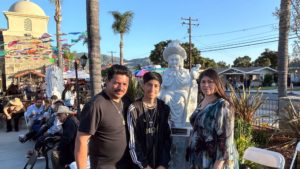
Pedro Salceda, center, came to Santa Paula from San Diego May 25 with his parents Gerardo and Claudia. Behind them is a statue of the Santo Niño de Atocha in the patio of Our Lady of Guadalupe Church. (Pablo Kay)
After the Saturday evening Mass, celebrated outdoors by Archbishop Gomez, Pedro embraced his mom, Claudia, near a white Santo Niño statue in the parish patio.
“I know that if I went through this, it was to make me a stronger person,” said Pedro, whose intestinal problems have stopped since a successful operation at the Cleveland Clinic in Ohio three years ago. “Although I suffered a lot, everything had a reason.”
Incidentally, the elder Salceda’s belief in the Holy Child came from his mother’s prayers for an intestinal problem (unrelated to his son’s) he had as a young boy. Asking for miracles, Gerardo says, takes patience.
“Everything has its time, and God knows when to act.”
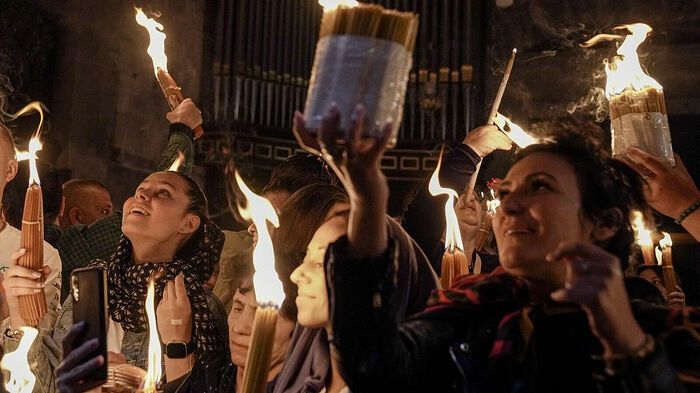
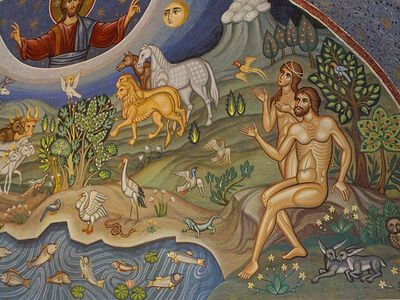 The Mystery of Primordial Paradise. Part 1. What is life in Paradise like?Divine Revelation tells us that God didn’t place man in the primordial Paradise to relax under the palms and pick the fruit of the trees of Paradise.
The Mystery of Primordial Paradise. Part 1. What is life in Paradise like?Divine Revelation tells us that God didn’t place man in the primordial Paradise to relax under the palms and pick the fruit of the trees of Paradise. On The Sufferings in Hell and the Kingdom of GodThe kingdom of God is within you (Lk. 17:21), said the Lord; that is, in the heart. Therefore, it is necessary to seek it out in the heart, cleansing it of the passions and assaults of the enemy, judging and reproaching no one…—St. Macarius of Optina”>hell, you face a fairly well-established notion of them as a reward or retribution from God in the afterlife. People see Paradise as the final reward for a righteous and good way of life,1 and hell as the final punishment for a sinful and evil one.2
On The Sufferings in Hell and the Kingdom of GodThe kingdom of God is within you (Lk. 17:21), said the Lord; that is, in the heart. Therefore, it is necessary to seek it out in the heart, cleansing it of the passions and assaults of the enemy, judging and reproaching no one…—St. Macarius of Optina”>hell, you face a fairly well-established notion of them as a reward or retribution from God in the afterlife. People see Paradise as the final reward for a righteous and good way of life,1 and hell as the final punishment for a sinful and evil one.2  On the Last JudgmentThe Gospel calls to purity and a pious life us who await the “day of the Lord”.
On the Last JudgmentThe Gospel calls to purity and a pious life us who await the “day of the Lord”. What Is True Repentance?True repentance is impossible without the renewal of a constant petition, invocation, repentant falling, prayer, and supplication to the Heavenly Father. It’s also a sign of the forgiveness of sins—the constant turning of the mind and heart to God.
What Is True Repentance?True repentance is impossible without the renewal of a constant petition, invocation, repentant falling, prayer, and supplication to the Heavenly Father. It’s also a sign of the forgiveness of sins—the constant turning of the mind and heart to God. Sin Is Marriage with SatanSin will never lead us to good; it brings only evil, torment, and suffering. It’s the consequence of our deeds, not the punishment of God.
Sin Is Marriage with SatanSin will never lead us to good; it brings only evil, torment, and suffering. It’s the consequence of our deeds, not the punishment of God. Faith in God is a Deadly Cross for Human PrideFrom the moment you meet and convert to Christ, your intensely difficult spiritual work begins of self-improvement, of being transformed into the image and likeness of Jesus of Nazareth.
Faith in God is a Deadly Cross for Human PrideFrom the moment you meet and convert to Christ, your intensely difficult spiritual work begins of self-improvement, of being transformed into the image and likeness of Jesus of Nazareth. Are Hell and Paradise Outside Ourselves?The everlasting Heavenly bliss and torments of hell in the afterlife are the natural fruits and natural consequences of our earthly lives.
Are Hell and Paradise Outside Ourselves?The everlasting Heavenly bliss and torments of hell in the afterlife are the natural fruits and natural consequences of our earthly lives.
 Pride is the First Daughter of the DevilFirst of all, we need to love God, because for this temporary life He gave us such a large, comfortable earth, a great variety of plants, springs, rivers, seas, fish, animals, as well as air, fire, day, night, sky, stars, sun, and moon.
Pride is the First Daughter of the DevilFirst of all, we need to love God, because for this temporary life He gave us such a large, comfortable earth, a great variety of plants, springs, rivers, seas, fish, animals, as well as air, fire, day, night, sky, stars, sun, and moon. The Parable of the SowerWhoever desires to know the truth, whoever does not silence the voice of conscience within himself, let him ponder the meaning of this parable and apply it to himself…
The Parable of the SowerWhoever desires to know the truth, whoever does not silence the voice of conscience within himself, let him ponder the meaning of this parable and apply it to himself…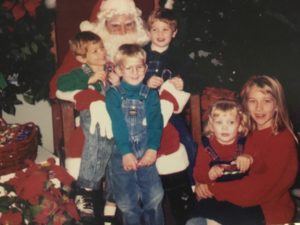
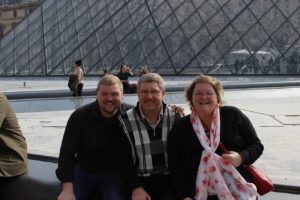


 Pilgrimage to relics of St. John the Russian in Evia draws 1,500+The holy walk, held on Sunday, May 19, marks the 9th annual Pilgrimage organized by the Region of Central Greece with the blessing and support of the Metropolis of Chalkida.
Pilgrimage to relics of St. John the Russian in Evia draws 1,500+The holy walk, held on Sunday, May 19, marks the 9th annual Pilgrimage organized by the Region of Central Greece with the blessing and support of the Metropolis of Chalkida.
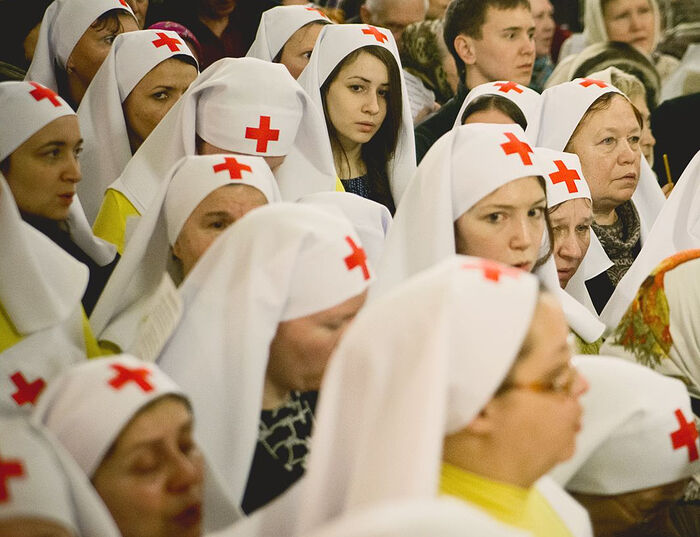
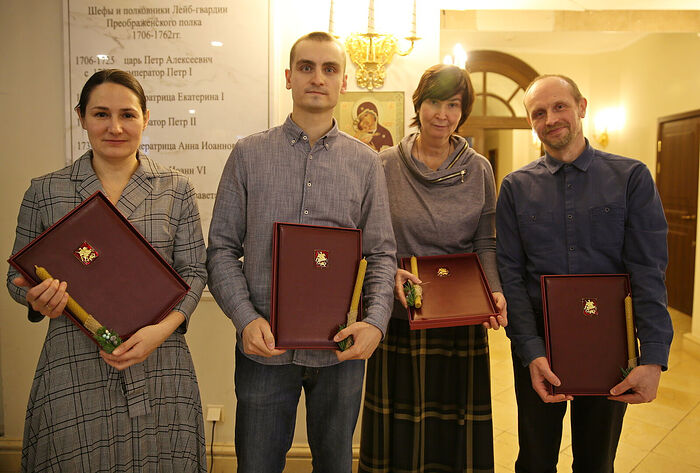

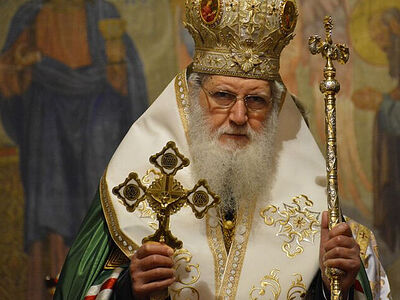 Patriarch Neofit of Bulgaria reposes in the LordThe Patriarch was in poor health in recent years.
Patriarch Neofit of Bulgaria reposes in the LordThe Patriarch was in poor health in recent years.
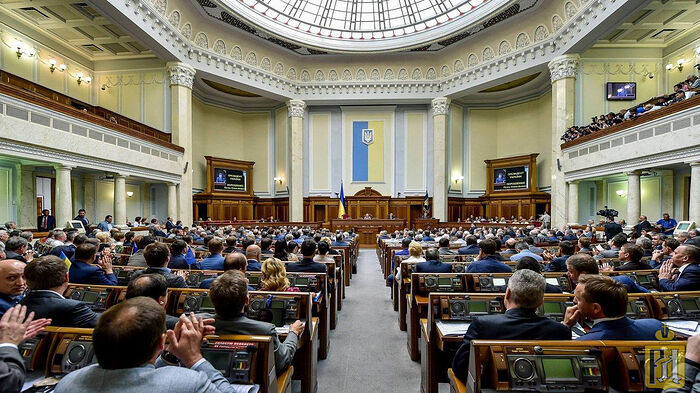
 Ukrainian Parliament votes for bill to ban UOC in first reading, second reading still to comeMany local administrations have declared bans on the Church, though at the same time, the Church’s activities have continued in those localities.
Ukrainian Parliament votes for bill to ban UOC in first reading, second reading still to comeMany local administrations have declared bans on the Church, though at the same time, the Church’s activities have continued in those localities. Truth about what’s happening to the Ukrainian Church is banned in the U.S., UOC lawyer tells Tucker Carlson (+VIDEO)“It is shocking to me that a country such as the United States, with strong Christian leadership—I thought—could allow this to go on,” Amsterdam says.
Truth about what’s happening to the Ukrainian Church is banned in the U.S., UOC lawyer tells Tucker Carlson (+VIDEO)“It is shocking to me that a country such as the United States, with strong Christian leadership—I thought—could allow this to go on,” Amsterdam says. It was U.S. policy to destroy the Ukrainian Orthodox Church, says Church’s lawyerIn an interview published yesterday, Amsterdam reveals that his team recently learned from the Assistant Secretary of State under Trump that the destruction of the UOC was a point of U.S. policy, which involved former Ukrainian President Poroshenko and Patriarch Bartholomew of Constantinople.
It was U.S. policy to destroy the Ukrainian Orthodox Church, says Church’s lawyerIn an interview published yesterday, Amsterdam reveals that his team recently learned from the Assistant Secretary of State under Trump that the destruction of the UOC was a point of U.S. policy, which involved former Ukrainian President Poroshenko and Patriarch Bartholomew of Constantinople. Security Service raids offices of Orthodox journalists and lawyersOne of the four men detained is the rector of a church in the capital.
Security Service raids offices of Orthodox journalists and lawyersOne of the four men detained is the rector of a church in the capital.